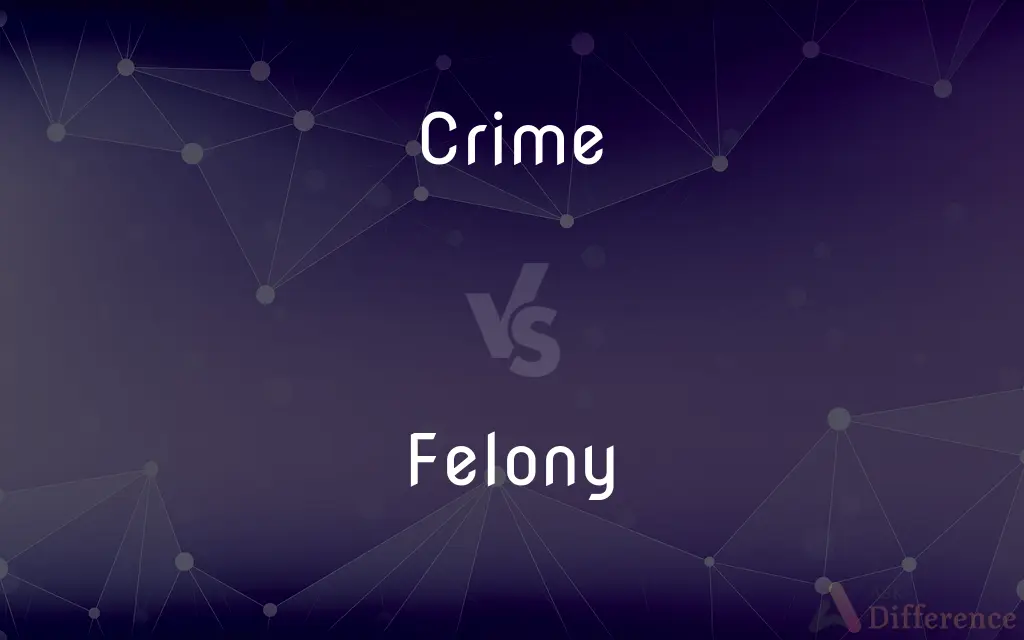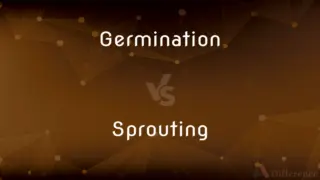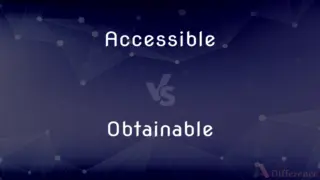Crime vs. Felony — What's the Difference?
By Urooj Arif & Maham Liaqat — Updated on April 15, 2024
Crime encompasses any act violating the law, while a felony refers specifically to serious crimes punishable by imprisonment for more than a year.

Difference Between Crime and Felony
Table of Contents
ADVERTISEMENT
Key Differences
A crime is any action or omission that violates a law and is subject to a legal penalty. On the other hand, a felony is classified as a severe type of crime, often associated with serious harm to individuals or society. In the United States, felonies include rape, and kidnapping, whereas minor offenses such as jaywalking or littering are typically considered infractions or misdemeanors, not felonies.
While all felonies are crimes, not all crimes are felonies. Lesser crimes, known as misdemeanors, are punishable by shorter prison terms or other non-prison penalties. This distinction affects the severity of the legal proceedings and the potential consequences faced by the accused.
The legal system treats felonies with greater severity due to their potential to cause significant harm. For example, felonies often lead to trials in higher courts, whereas misdemeanors may be handled in lower local courts. This reflects the seriousness with which the legal system treats these offenses.
Another key difference lies in the long-term impact on individuals. Conviction of a felony can lead to losing voting rights, employment difficulties, and other long-lasting repercussions, whereas misdemeanors typically result in less severe long-term effects.
The procedures and rights available to defendants in felony cases can be more extensive, including the right to a grand jury in some jurisdictions. This is indicative of the serious nature of felonies and the careful judicial process required to adjudicate such serious accusations.
ADVERTISEMENT
Comparison Chart
Definition
Any act violating legal statutes
A serious crime, typically punishable by prison
Severity
Can range from minor (misdemeanor) to major (felony)
Always major
Long-term repercussions
Generally limited unless it escalates to felony
Loss of certain rights, significant stigma
Compare with Definitions
Crime
Any act that poses significant harm to individuals or community.
Driving under the influence is a crime due to its potential for harm.
Felony
An act punishable by more than one year in prison.
Bank robbery is a felony due to its threat to public safety.
Crime
A breach of rules or laws for which some governing authority can ultimately prescribe a conviction.
Tax evasion is a crime that undermines government revenue.
Felony
A category of crimes considered more severe than misdemeanors.
Kidnapping is a felony with severe legal consequences.
Crime
An action or omission that constitutes an offense that may be prosecuted by the state.
Arson is a crime that involves deliberately setting property on fire.
Felony
Crimes that can lead to significant legal penalties and societal stigmatization.
Drug trafficking is a felony that often results in long prison sentences.
Crime
An illegal act punishable by a state or other authority.
Stealing is a crime that can lead to arrest.
Felony
A felony is traditionally considered a crime of high seriousness, whereas a misdemeanor is regarded as less serious. The term "felony" originated from English common law (from the French medieval word "félonie") to describe an offense that resulted in the confiscation of a convicted person's land and goods, to which additional punishments including capital punishment could be added; other crimes were called misdemeanors.
Crime
Actions punishable by law, ranging from minor infractions to major felonies.
Shoplifting is a crime and can lead to fines or jail time.
Felony
Any of several crimes in early English law that were punishable by forfeiture of land or goods and by capital or other serious punishment.
Crime
In ordinary language, a crime is an unlawful act punishable by a state or other authority. The term crime does not, in modern criminal law, have any simple and universally accepted definition, though statutory definitions have been provided for certain purposes.
Felony
An act on the part of the vassal which cost him his fee by forfeiture.
Crime
An act committed in violation of law where the consequence of conviction by a court is punishment, especially where the punishment is a serious one such as imprisonment.
Felony
An offense which occasions a total forfeiture either lands or goods, or both, at the common law, and to which capital or other punishment may be added, according to the degree of guilt.
Crime
Unlawful activity
Statistics relating to violent crime.
Crime
A serious offense, especially one in violation of morality.
Crime
An unjust, senseless, or disgraceful act or condition
It's a crime to waste all that paper.
Crime
(countable) A specific act committed in violation of the law.
Crime
(countable) Any great sin or wickedness; iniquity.
Crime
That which occasions crime.
Crime
(uncountable) Criminal acts collectively.
Crime
(uncountable) The habit or practice of committing crimes.
Crime doesn’t pay.
Crime
To subject to disciplinary punishment.
Crime
(nonce word) To commit crime.
Crime
Any violation of law, either divine or human; an omission of a duty commanded, or the commission of an act forbidden by law.
Crime
Gross violation of human law, in distinction from a misdemeanor or trespass, or other slight offense. Hence, also, any aggravated offense against morality or the public welfare; any outrage or great wrong.
Crime
Any great wickedness or sin; iniquity.
No crime was thine, if 'tis no crime to love.
Crime
That which occasion crime.
The tree of life, the crime of our first father's fall.
Crime
(criminal law) an act punishable by law; usually considered an evil act;
A long record of crimes
Crime
An evil act not necessarily punishable by law;
Crimes of the heart
Common Curiosities
How do felonies affect employment?
Many employers conduct background checks that reveal felony convictions, which can hinder job opportunities.
What defines a crime?
A crime is any act that violates a law and is punishable by fines, imprisonment, or other sanctions.
What rights are lost with a felony conviction?
Felony convictions can lead to the loss of voting rights, firearm possession rights, and certain professional licenses.
Can felonies ever be expunged from a person’s record?
In some jurisdictions, felonies may be expunged under specific conditions, but this varies widely.
What is the least severe type of crime?
Infractions or petty offenses, which are only punishable by fines and do not lead to imprisonment, are the least severe.
Are all illegal acts considered crimes?
Yes, any act that breaks a law is technically a crime, though the severity can vary widely.
Can a misdemeanor become a felony?
Yes, under certain conditions, such as repeat offenses or severe circumstances, a misdemeanor can be elevated to a felony.
Are felonies treated similarly worldwide?
The classification and treatment of felonies can vary significantly between different countries and legal systems.
How do court systems differ between crimes and felonies?
Felony charges typically require more formal court processes, including grand juries and trial juries, compared to lesser crimes.
How does a felony affect voting rights in the U.S.?
Many states disenfranchise individuals with felony convictions, often permanently.
How does society view misdemeanors versus felonies?
Society generally views felonies as much more serious than misdemeanors, reflecting in harsher judgments and stigmatization.
What role do police play in dealing with crimes?
Police enforce laws by investigating crimes and arresting individuals suspected of committing them.
What types of crimes are considered felonies?
Crimes involving great bodily harm, significant property damage, or major theft are typically felonies.
What is the usual punishment for a misdemeanor?
Misdemeanors are typically punishable by less than a year of imprisonment, or only fines.
Share Your Discovery

Previous Comparison
Germination vs. Sprouting
Next Comparison
Accessible vs. ObtainableAuthor Spotlight
Written by
Urooj ArifUrooj is a skilled content writer at Ask Difference, known for her exceptional ability to simplify complex topics into engaging and informative content. With a passion for research and a flair for clear, concise writing, she consistently delivers articles that resonate with our diverse audience.
Co-written by
Maham Liaqat















































